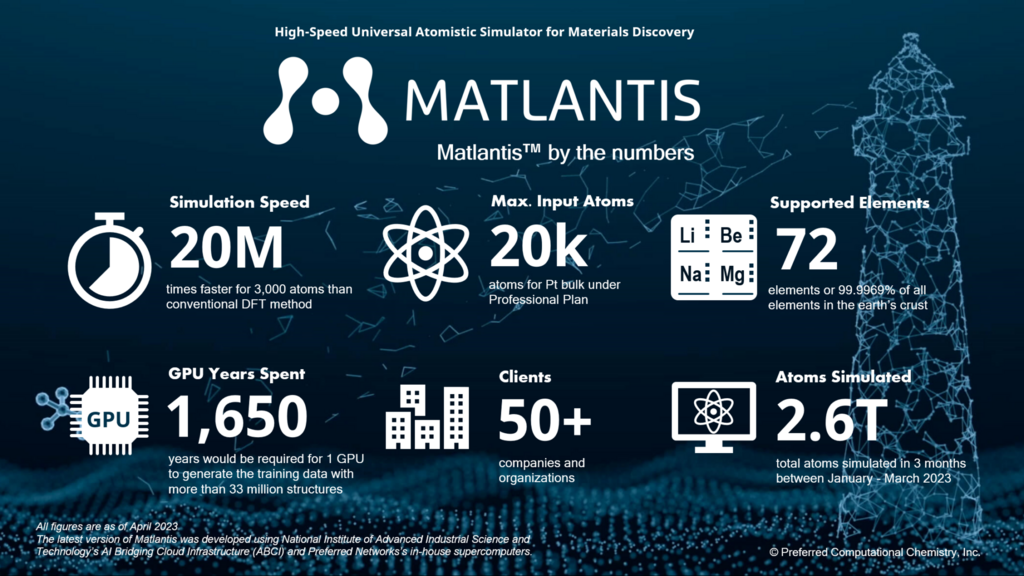2023.4.28
press release
PFCC Launches Matlantis High-Speed Universal Atomistic Simulator for AI-Driven Materials Discovery in United States
Preferred Computational Chemistry (PFCC), a joint venture between Preferred Networks, Inc. (PFN) and ENEOS Corporation (ENEOS), has launchedMatlantis ™, a cloud-based, high-speed universal atomistic simulator for artificial intelligence (AI)-driven materials discovery, for companies and organizations in the United States. Matlantis uses its unique AI technology, which was also selected as an Editor's Choice by Nature Communications, to simulate the atomic-level behavior of new materials on a computer at up to 20 million times the speed of conventional density functional theory (DFT) calculations. Currently, more than 50 companies and organizations in Japan are using Matlantis to discover new materials.

Since PFCC launched Matlantis in Japan in July 2021, PFN and ENEOS have been continuously updating its simulation accuracy and universality while PFCC expanded the client base, incorporated user feedback and prepared for international launches. The current version of Matlantis now available in the U.S. can simulate up to about 19,000 atoms at a time and supports any combinations of 72 elements which comprise 99.9969% of the total mass of all elements above the earth’s crust [source]. The latest version 4 of the neural network potential named Preferred Potential (PFP), on which Matlantis is based, has been trained with a vast dataset of over 33 million virtual structures of molecules and crystals, enabling users to simulate behavior of undiscovered materials at an atomic level while searching for promising candidates. PFP’s training dataset was generated using supercomputers with computational resources equivalent to what a single graphic processing unit (GPU) would need 1,650 years of computation time for.
In three months between January and March 2023, Matlantis simulated over 2.6 trillion atoms for its clients in a range of domains including academia, automotive, chemical, electronics and energy industries. The use of target materials includes batteries and semiconductors as well as catalysts, absorbents and alloys for clean energy, environment and sustainable industry processes.
Daisuke Okanohara, CEO of PFCC, said:
“The U.S. has been the epicenter of countless technological breakthroughs and we are truly excited to bring Matlantis to help computational scientists in the U.S. make even more of them. We will also launch Matlantis in other markets to accelerate innovation by making it faster for researchers around the world to discover new materials for a sustainable future.”
米国でのサービス提供にあたり、マテリアルズ・インフォマティクスの最新動向や材料探索のためのニューラルネットワークポテンシャルの利用法について学ぶ機会として、PFCCはマサチューセッツ工科大学のJu Li教授を講師に迎えた無料のウェビナーを2023年5月30日8:00~9:30(日本時間)に開催する予定です。登録は matlantis.com で受け付けています。
*The latest version of Matlantis’s neural network potential was developed using National Institute of Advanced Industrial Science and Technology’s AI Bridging Cloud Infrastructure (ABCI) as well as PFN’s in-house supercomputers.
About Preferred Computational Chemistry
Preferred Computational Chemistry, Inc. (PFCC) was established in June 2021 in Tokyo as a joint venture between Preferred Networks, Inc. (PFN) and ENEOS Corporation (ENEOS) for the sale of Matlantis™, a cloud-based universal atomistic simulator jointly developed by PFN and ENEOS for high-speed materials discovery and development. PFCC’s mission is to accelerate innovation and support companies and organizations to discover innovative materials for a sustainable future.
Related News
-
2026.1.28press releaseProducts & ServicesNEW
-
2025.12.3press release
-
2025.11.21press release
Materials Scientists Embrace AI to Accelerate Discovery—Yet Nearly All Confront Compute Limitations